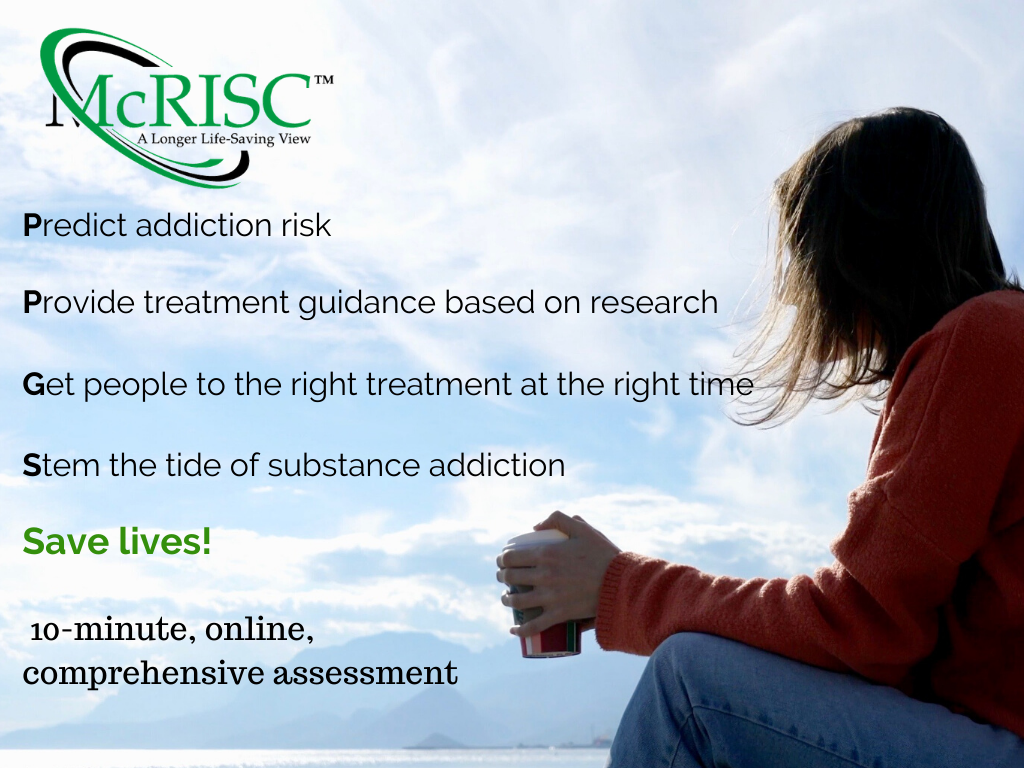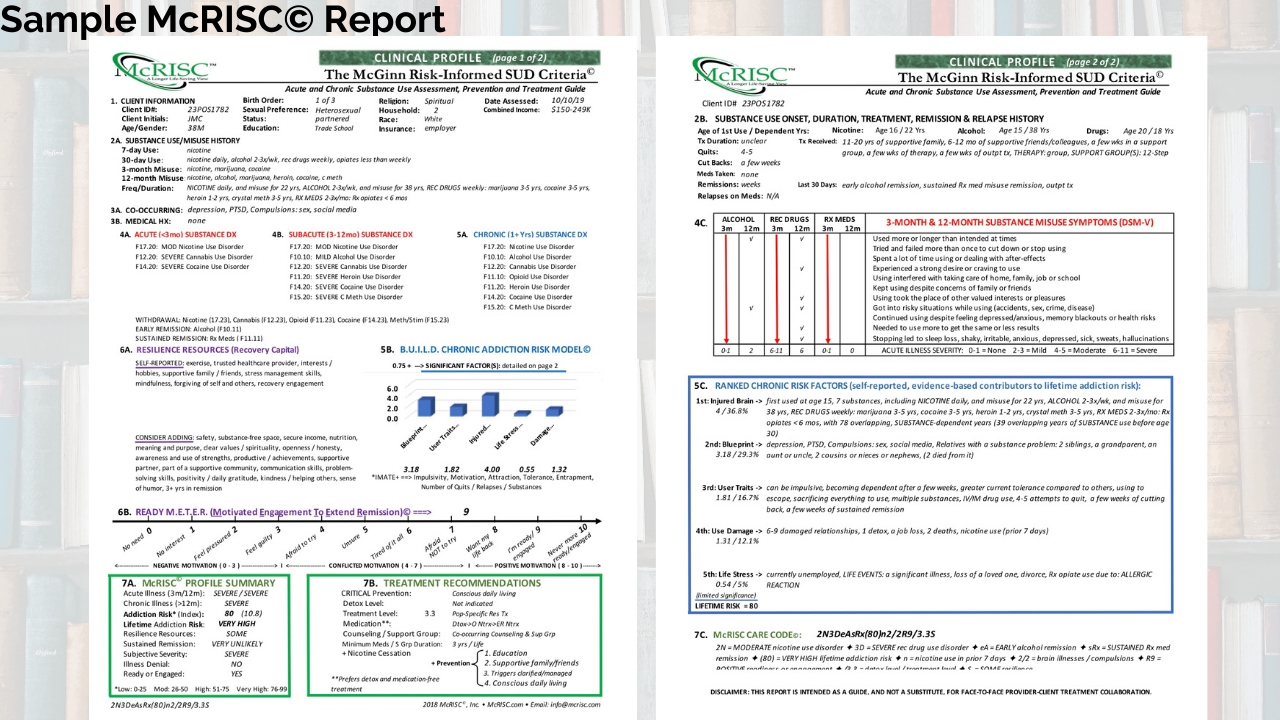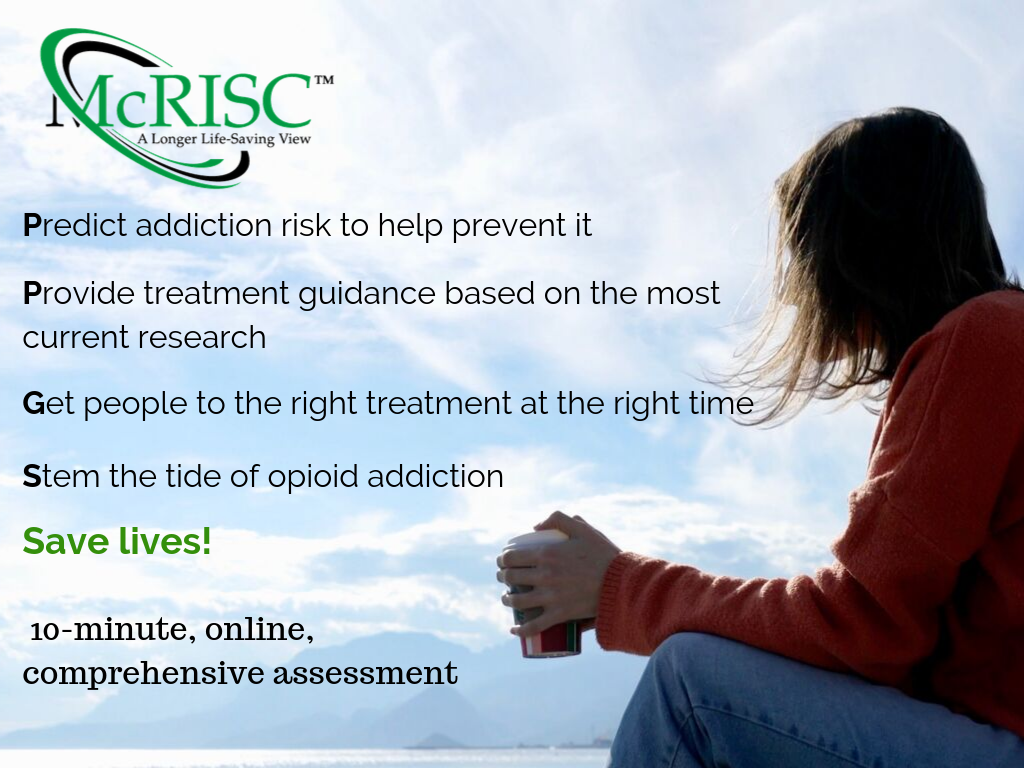Substance Use Assessment: Diagnostics, Risk Factors, Recovery Capital
McRISC© offers the first and only acute and chronic illness-driven substance use assessment, prevention and treatment guidance for healthcare and other providers.
Chicago, United States AMIA2019 challengeAbout our project

The problem we solve:


About Our Team

Creator: Calvin McGinn
Bio: Calvin’s extensive career (40+ years) as a nurse, PhD family therapist, and physician educator includes ongoing efforts on behalf of co-occurring disorders and addictions. Formerly a NAMI (National Alliance on Mental Illness) state trainer and 10-year Co-Chair of the National Forum for the Behavioral Sciences in Family Medicine, Calvin’s instincts as a recovery coach, program director, and clinical researcher are currently forging an evidence-based path that integrates risk-stratified substance illness care into a new assessment and treatment paradigm.
Hospital Affiliation: Advocate Healthcare
Title: Founder/Principal Researcher
Advanced Degree(s): Ph.D, LMFT, RN
About Team Members
Joyce Ann McGinn
Co-Founder/COO, B.S. OTR/L
Biography: Joyce Ann has spent 21 years dedicating her life to her integrated healing practice. Her formal Occupational Therapy, Feldenkrais, Masgutova Method (MNRI) training bring an empathic perspective to her work with those of varying levels of pain, PTSD, and developmental impairments. Joyce offers children, adults, and seniors, whether living on the spectrum or managing chronic pain, a healing path that restores balanced living, free of medication. She executes all phases of her business, and is McRISC, Inc.'s chief operating officer.
Title: Co-Founder/COO
Advanced Degree(s): B.S. OTR/L
Twitter:
https://twitter.com/mcriscinc
LinkedIn:
https://www.linkedin.com/in/joyceann123/
Angelica Chayes
Business Advisor, MBA
Biography: With two decades’ experience in startup, corporate, nonprofit, and campaign settings, Angelica brings a wealth of experience and effective strategic methodology to McRISC©. Angelica provides strategic business and organizational consulting.
Title: Business Advisor
Advanced Degree(s): MBA
LinkedIn:
https://www.linkedin.com/in/angelicachayes/
About Our Company
McRISC, Inc.
Location: 222 W Merchandise Mart Plaza
1230
Chicago 60654
US
Founded: 2018
Website: https://www.mcrisc.com
Twitter: twitter.com/mcriscinc
Facebook: https://facebook.com/mcriscinc
Product Stage: Prototype/MVP
Employees: 1-2
How We Help Patients
We believe we must end the stigma surrounding people who suffer with substance misuse. Substance Use Disorders (SUD) need to be treated the same as any other chronic condition, such as heart disease or diabetes. Only 10% of people suffering with this chronic illness get any kind of help, and those who do, frequently receive treatment that does not fit their needs. This must change. Serving those suffering with addictions and those at risk for developing the illness will help decrease the loss of life from those addictions and other substance-related illnesses.
Our goal is to help patients get to the right treatment at the right time.
Here's how:
- Make assessment easy and accessible to everyone everywhere, as long as they have an internet connection.
- Provide risk-informed assessment for better treatment options and long-term remission
- Improve treatment outcomes by providing individualized treatment plans for patients based on their unique set risks
- Reduce onset of illness by informing those with increased lifetime risk.
- De-stigmatize SUD by assessing and treating them as a chronic illnesses
- Exponentially increase the number of healthcare providers who treat this disease
- End the epidemic of opioid addiction and Substance Use Disorders (SUD)
- SAVE LIVES!
How We Help Physicians
McRISC© offers the first and only acute and chronic illness-driven substance use assessment, prevention, treatment, and remission guidance for healthcare providers. It’s online 24/7, accessible to anyone with a smartphone or internet access, takes 10 minutes, and delivers a comprehensive two-page report to healthcare providers and criminal justice reform. No identifiable information (PHI) is captured during the assessment process, making results secure and safely emailed and scanned into medical records (EHR).
Our assessment keeps improving, thanks to the invaluable input from our users and other addictions specialists. The tool is valid for diagnosing acute Substance Use Disorders (SUD) at 3-months and 12-months, and captures chronic risk factors beyond 12-months. We have added resilience factors to the mix to capture the positives in peoples' lives. The confluence of all of these areas risk-stratify the population, and guide improved prevention, in addition to more informed treatment facilitation.
Due to reduced assessment time, treatment providers will increase efficiency and ability to treat more patients effectively.
McRISC©'s two-page clinical profile includes the followiing:
- Acute diagnostics at 3-months and 12-months
- Ranked chronic illness risk factors beyond 12-monrhs
- Co-occurring brain illnesses and compulsions
- SUD treatment, remission and relapse history
- Recovery Capital: resilence factors
- Lifetime substance addiction risk to help target prevention
- Likelihood of sustained remission based on risk factors and recovery capital
- Level of motivated engagement, denial, and subjective severity
- Level of care placement, including detox
- Medication selection and minimum duration
- Support group kind and minimum duration
- Key demographics
McRISC© helps standardize quality improvement measures. Healthcare providers will be able to view their program demographics and diagnostic data, and risk-stratify their patient population into mild, moderate and severe illnesses. This will give providers the opportunity to evaluate their programs’ treatment effectiveness and alter their treatment protocols, depending on the types and severity of patients that see them.
How We Help Hospitals
McRISC© has developed a comprehensive solution to the current opioid epidemic and other SUD by replacing the revolving acute illness door with a longer life-saving view.
Due to reduced assessment time in busy ERs and primary care practices, treatment providers will increase efficiency and ability to treat more patients effectively. McRISC© offers risk-stratified treatment recommendations leading to better treatment outcomes. This includes risk-informed guidance for chronic pain management to lower the risk of prescribing opioids to high risk patients and choosing the best medications to treat SUD, as well as recommended level of care placement (including detox).
McRISC© helps standardize quality improvement measures. Healthcare providers will be able to view their program demographics and diagnostic data, and risk-stratify their patient population into mild, moderate and severe illnesses. This will give providers the opportunity to evaluate their programs’ treatment effectiveness and alter their treatment protocols, depending on the types and severity of patients that see them.
Currently, there is no consolidated database that includes lifelong risk factors which contribute to Substance Use Disorders (SUD). Growing a research database will better inform assessment, prevention, and treatment strategies, offering the research community a centralized interacting database of risk factors to help inform SUD understanding and treatment.
McRISC© is positioned to reduce costs to healthcare providers and patients through quality prevention, treatment, and long-term SUD management. Prevention and individualized treatment guidance toward appropriate long-term SUD management will reduce substance-related illnesses and adverse effects of SUD. Quality Improvement Organizations (QIO) and insurance companies will be able to increase their ability to support quality programs.
How We Help Partners
McRISC© can be invaluable to busy hospitals, ERs, providers in the community, primary care, and rural settings where hospitals and addiction treatment are not as easily accessible. It is available online (mcrisc.com), 24/7, takes 10 minutes, multilingual, and provides detailed guidance for people with SUD, those at risk for developing it, and healthcare providers serving them. Healthcare providers can direct their patients to the assessment, or patients can self-administer the assessment and request their results be sent to their provider.
Due to reduced assessment time, treatment providers will increase efficiency and ability to treat more patients effectively. McRISC©'s Clinical Profile is an essential tool to increase healthcare providers' participation in SUD treatment with greater confidence and encourage them to become waivered to prescribe medications for SUD populations.
Hospitals are moving toward using electronic health records (EHR) that allows healthcare to be accessible anywhere somebody is in the country. These assessment results can be embedded in the EHR. No Protected Health Information (PHI) or personally identifiable information is captured, making results secure and safely emailed and scanned into medical records (EHR).
McRISC© is positioned to reduce costs to healthcare providers and patients through quality prevention, treatment, and long-term SUD management. Prevention and individualized treatment guidance toward appropriate long-term SUD management will reduce substance-related illnesses and adverse effects of SUD. Quality Improvement Organizations (QIO) and insurance companies will be able to increase their ability to support quality programs.
Challenge Mission
Affiliation(s)
McRISC, Inc. is currently in collaboration with the University of Cincinnati, School of Criminal Justice. McRISC© is also a member of MATTER Health, Chicago and New York.
Key Milestones Achieved and Planned
-
In October 2016, Calvin began research and development of McRISC© by taking well-documented, known chronic illness SUD risk-factors and creating a simple paper/pencil assessment.
-
Fall of 2017: First validation: McRISC© 0.5 was introduced to nine Chicago SUD treatment centers. (107 participants) McRISC© showed early promise at risk-stratifying SUD illness severity and duration and determining a person’s likelihood of staying in remission if they quit substances, appropriate medications based on risk level, and readiness for treatment.
-
McRISC© introduced its first online assessment in February 2018 and was founded in April 2018.
-
February to June 2018, Second tool construct validation with 95 participants.
-
2019 Third construct validation ongoing with 85 participants to date.
-
October 2018: Began providing Clinical Profiles to healthcare providers as part of our validation process of the new online tool.
-
2019 - Current collaboration with University of Cincinnati, School of Criminal Justice, and SUD treatment providers and facilities
Our Competitive Advantages
McRISC© is already ahead of the competitors with it's acute diagnostics and longer life-saving view. No one has attempted to risk-stratify those with Substance Use Disorders, and no other tool is able to predict addiction or remission risk or distiinguish agonist vs. antagonist medications.
The assessment’s branching questions can be easily updated as research informs better evidence-based risk-factors and treatment options. Based on over 7000 possibilities of interacting factors, using weighted algorithms, it creates the necessary relationships among the variables that enable individual treatment recommendations, giving it optimal potential to improve patients’ outcomes.
The McRISC BUILD Model©: evidence based chronic illness risk factors including Blueprint (genetics), User traits, Injured developing brain, Life Stressors, and Damage from use.
McRISC© 's Ready Meter (Motivated Engagement to Extend Remission)© scale provides guidance to providers at any level of readiness to get them onto a path toward wellness.
Barriers to Entry
Our growth is based on our mission of serving those suffering with addiction and those at risk for developing the illness. Our success predicates on the following:
-
How well we can help manage Substance Use Disorders by getting more healthcare providers into the assessment and treatment process throughout all phases of the illness.
-
Getting more people into long-term remission
-
Preventing addiction for those potentially being prescribed habit forming drugs for pain, or in danger of developing an addiction based on their lifetime risk factors.
Key indicators of success:
Clinical Profiles will lead to fewer substance related deaths, addiction prevention by prescribing less opioids, and improved treatment outcomes with targeted level of care; Increased SUD treatment with our future referral database; Increased revenues from licensing; and Increased number of McRISC© Partner providers and end users projected:
2020: 61 Provider partners, 9.6K assessments, 2021: 181 Provider partners, 47K assessments, 2022: 481 Provider partners, 161.4K assessments.
Funding, Partners and Alliances To Date
McRISC© seeks funds primarily for technology development and for personnel, sales and marketing.
Proposed phase one MVP (growth):
- Build App, Service, and DBMS
-
Streamline the assessment tool
-
Automate the creation and delivery of reports
-
60 second turnaround
-
Manage the data
-
Accounts management, billing and CRM will remain concierge until phase two
Proposed phase two (scale):
-
10-second turnaround.
-
Provider referral database: Develop a substance addiction healthcare provider database that can be accessed upon taking the assessment tool for treatment induction in the US, and to expand to other countries.
-
Business technology development: Custom relational database to mimic and automate calculations and business functions. This will include intensive analytics and reporting capabilities, invoicing, payments, accounting functions, and more that are necessary to run the business.
-
Relational database: The creation of this system will include intensive analytic reporting capabilities on the data co
Revenue
No revenues to date.
Innovation Details
Intellectual Property Summary
McRISC© is copyrighted, considered intellectual property, and the derivation of the McRISC© assessment results will remain a trade secret.
Clinical Information
Pilot In-Treatment Cohort (2017): McRISC 0.5 (McGinn Recovery Index Screening Checklist)© was introduced to nine Chicago SUD treatment centers in the fall of 2017. The 107 completed assessments included 63 males, 44 females (median age 31.1 and 28.1, respectively), and 4 of unclear gender. Participant median age first dependent (17.2 males, 17.8 females) fell well within developing brain-mediated risk, with a -0.46 inverse correlation (p<0.0001) between age first dependent (excluding tobacco) and risk scores. As the graph below illustrates, McRISC0.5© showed early promise at risk-stratifying SUD illness severity and duration, especially when comparing attempts to quit, adverse events, and overlapping dependency years to age 30. Study weaknesses included the limited sample size skewing demographics, outliers, and external validity.
Non-Treatment Cohort (2018): McRISC 1.0 (McGinn Risk-Informed SUD Criteria)© Morphed from paper-and-pencil into an online assessment with 52-branching items completed by those not currently in treatment. The 95 assessments included 38 males, 49 females (median age 36 and 48, respectively), and 8 of unclear gender. Results (see below) continued to show consistent correlations from low to moderate to high risk scores among all key factors assessed. Results and healthcare provider input led to a third revision with more items added, yet with minimal impact on the average 10-minute completion time.
Combined In-Treatment/Non-Treatment Cohort (2019): McRISC 1.1 (McGinn Risk-Informed SUD Criteria)© Online data collection of the revised, 89-branching item assessment among respondents, regardless of treatment status, began in 2019. The 85 completed assessments reviewed here include 39 males, 40 females (median age 48 and 44.5, respectively), and 6 of unclear gender. Clinical Profiles were emailed to those treatment providers who signed up to assist in data collection in return for the robust clinical data provided (see sample profile to the right). Once again, correlations between McRISC 1.1scores and nearly all evidence-based risk factors continued to confirm the tool’s construct validity.
Institutional Review Board Office at participants@solutionsirb.com or by phone at 855-226-4472.
IRB Registration # 2017/09/06
Regulatory Status
NA
How we will use the funds raised
Our goals are twofold: Collect and analyze data for McRISC©, our prototype assessment tool to provide the best standard of care for addiction assessment and treatment; and automate our assessment to provide real time research-validated results to reach everyone, 24/7, regardless of socio-economic, cultural, or language barriers.
In order to do this, we are requesting $180,000 for the following:
- Full-Time Principal Researcher for one year
- Part-time administrative assistant for one year
- Research equipment
- Technology architect and first phase of development
Thank You
When the opioid crisis exploded, we were surprised to learn that the medical community had not adopted what was known about chronic illnesses to the treatment of addictions. Healthcare providers were not equipped to confidently apply the same risk-informed standard of care practices used for decades to manage every other chronic illness, such as diabetes and heart disease.
With this realization, we knew we had to leverage our considerable expertise and compassion for people affected by this issue. We researched all that is known about addiction and applied it to our tool to develop a quick, easy to use, easily accessible, comprehensive, Substance Use Disorders (SUD) assessment, prevention, as well as treatment-informing guide for healthcare providers. It can be easily updated as research evolves, and its centralized database will create an unprecedented source of anonymous data for further SUD research, and development of new treatments.
We are excited that McRISC© is now available for use as the first acute and chronic illness-driven Substance addiction assessment. We are in a large-scale research phase, prototyping with incredible partners across the United States to validate our assessment. But we need help with our next growth spurt to make McRISC© as effective and accessible as possible by reaching everyone. To get there, we have two goals:
We need a full time researcher, an administrative assistant, and a research computer, and we need fully developed technology that offers immediate reports, 24/7, to assist those who need it.
Our mission is to de-stigmatize SUD, prevent substance addictions, optimize treatment for sustained remission, reduce substance-related costs, make widespread prevention and treatment of addiction accessible to everyone, and save lives. We believe McRISC© brings a solution to the deadliest epidemic in American history by prioritizing a chronic (vs. acute) illness perspective to address a lifelong (vs. short term) condition. We know the first step–improved assessment—will bring improved answers to resolving it.
Updates
No updates found .
Supporters
-
 , MS, RDN, LDN
, MS, RDN, LDN
11/03/2019 - Liked the project. , Ph.D, LMFT, RN
, Ph.D, LMFT, RN
11/03/2019 - Liked the project.
11/01/2019 - Followed the project.
10/29/2019 - Backed the project for $100 Instant Feedback
Instant Feedback
Help us find best new ideas to fund by telling us what you think. Your feedback goes straight to the team behind this project in private, so tell them what you really think.
76Medstartr
Index Score76
Interest
Score0
Adoption
Score5
Likes0
Partners0
Pilots1
Follows-
This campaign has ended but you can still get involved.See options below.
$100 pledged of $10,000 goal
Instant Feedback
Help us find best new ideas to fund by telling us what you think. Your feedback goes straight to the team behind this project in private, so tell them what you really think.


